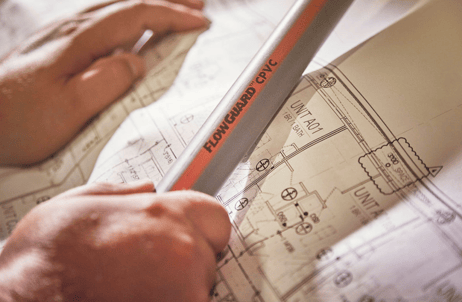Choosing CPVC Piping for Corrosion-Prone Conditions
In several occasions this blog has proved how FlowGuard® CPVC meets or exceeds the necessary safety, performance and quality assurance requirements of key international agencies. Many specifiers may still question whether they should design with CPVC on residential and commercial projects that handle corrosive desalinated drinking water.
First commercialized in 1959 by Lubrizol Advanced Materials, CPVC has proven over nearly six decades to be a viable piping alternative for a variety of corrosive industrial applications where such resistance is imperative. As Corzan®, CPVC is approved for use in seawater desalination systems on ships and offshore platforms. It can also handle chemical feeds for reverse osmosis processes, including strong acids and bases, salts and reducing agents used to rinse ion exchange resins, or in post-treatment pH adjustment and re-hardening including post chlorination of the freshwater stream.
CPVC differs from PPR and from other plastic materials in that approximately 40 percent of the bonding sites on its carbon backbone are filled with large, strategically placed chlorine atoms. They protect the molecular chain from attack and provide CPVC with its superior chemical – and temperature – resistance. In fact, CPVC is also the material used in BlazeMaster® Fire Protection Systems, the world’s most-specified nonmetallic fire sprinkler system for light hazard occupancies as defined in NFPA 13, 13R and 13D.
The reality is that with proper design and excellent craftsmanship in installation, you should have confidence that CPVC is up to the task of the most demanding operating conditions. When specifiers choose CPVC as the material for the following industries, why would you have any doubt?
- Marine
- Chemical processing
- Chlor-alkali
- Food and beverage
- Metal finishing (chrome plating)
- Mineral processing
- Power generation
- Pulp and paper
- Semiconductor
- Wastewater treatment
This is why FlowGuard CPVC is viewed as inherently desirable for plumbing pipe carrying chlorinated water, whether it be for residential applications carrying desalinated water or critical medical construction applications. With NSF 14 and 61 approvals for plumbing and potable drinking water applications as well as the Saudi Arabian Standards Organization (SASO), FlowGuard CPVC excels under conditions that could degrade and reduce the service life of many metals and other plastic materials.

Learn how to install CPVC, the piping material designed for withstanding harsh conditions. Download our Installation Guide today.
.png)
-1.png)
